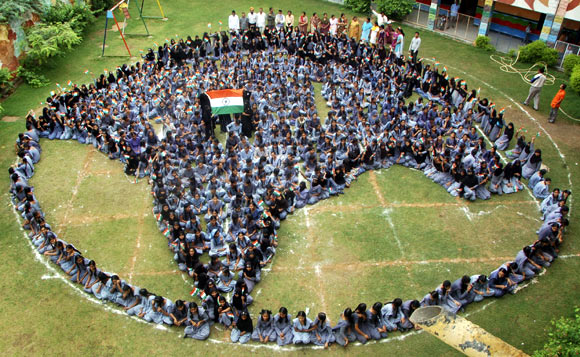Let me first set the record straight. Whilst often used interchangeably, patriotism and nationalism are not synonymous to each other. While patriotism is a political concept, nationalism is a cultural construct. In other words, while patriotism entails a love for one’s country and a desire to defend its political boundaries; nationalism, according to the Oxford English dictionary, on the other hand, is defined as “(1) a desire by a group of people who share the same race, culture, language, etc. to form an independent country; (2) a feeling of love for and pride in your country; and (3) (often disapprovingly) a person who has a feeling that their country is better than any other.”
If we take a closer look at the above definition of nationalism, we know that it becomes especially relevant when used in the context of a country like India, which is unique – given both its cultural diversity and its cultural diaspora. While nationalism, during the Indian war of independence, was a simpler concept since we were waging war against an external entity (aka the British), nationalism since then has become a rather feared concept…ever since it has become muddled with concepts of ‘Hindutva’ or ‘Saffronisation’ or ‘Islamophobia’ or ‘Dalit identity’ or ‘Brahmanisation,’ etc.

That however, is the distorted face of ‘nationalism’ and thus, is not the premise of the present article. Simply because when nationalism decides to rear its ugly head, it has the power of creating monsters like Hitler, whose fanatical fatalistic policies like the ‘Final Solution’ still manages to conjure images of unparalleled horror…all carried out in the name of misplaced nationalism [i.e., the supremacy of the ‘Aryan race’].
However, when we speak of nationalism – expressed in its positive light – we’re referring to the sense of loyalty we must feel towards our country and our community. Hence, unlike the negative connotation of nationalism, which translates into one race’s rise at the cost of another, we need nationalism as Gandhi envisioned when he said, ‘My nationalism is as broad as my Swadeshi, I want India’s rise so the whole world may benefit.’
In fact, nationalism is not just desired, it is required for any society to exist. It is what gives groups a sense of identity and belongingness. In fact, according to Roger Masters (1989), nationalism involve three levels of common interests (of individuals/groups) in order to promote a national identity:
A. On an individual level : Man cannot survive alone. He needs the comfort of security provided by a group. Hence, he is consciously/subconsciously motivated towards group-formation. [This is why even the primitive man lived in a community].
B. At the intra-group level : Groups, thus formed, need to cooperate with each other in order to secure collective goods that are otherwise inaccessible through individual effort alone. [This is why even the primitive man hunted in a group].
C. At the inter-group level : Humans respond to competition or conflict by organizing themselves into groups, either to attack the other groups or to defend their own group from the other groups. [This is why the modern military – even though organised into distinct groups/sub-groups such as the army, air force, and the navy – come together to fight as a single unit when there is an external threat of aggression].
Hence, speaking from an evolutionary point-of-view, nationalism is a prerequisite for living in a group. Off late, our country has faced some serious threats to our nationalism. Be it the caste politics that divides us or the gender-based politics that has men resenting women and vice versa, we are looking at a dangerous time when politicians (and other individuals for their own selfish reasons) are using ‘divide-and-rule’ politics/policies for their own petty gains. In fact, be it the question of reservations or the great divide between the have’s and the have not’s, these are serious threats to our nation that can not only derail the progress we’ve made so far, but can seriously threaten the very survival of the world’s largest democracy.
Fortunately though, we are slowly but surely realising the malicious intent of these Machiavellian villains. However, there is a need for the youth to be more proactive in combating these negative forces. How? Simple – instead of using ‘group identity’ as a dividing force, we need to proactively cooperate with one another, irrespective of our caste, religion, and racial identities. This can be achieved in several ways, such as: through inter-caste marriages and inter-religious weddings; by forging friendships with people from other religions and community; by using the social media for spreading awareness; by forming youth groups comprising members from a cross-section of society; by saying ‘no’ to reservations and saying ‘yes’ to merit; by consciously not letting our own prejudices dictate our relationships with members of other races, etc. In fact, there’s so much we can do…if only we decide to do it. And we’ll finally see a time where everyone prospers in tandem… so that my rise need not spell your doom.






























